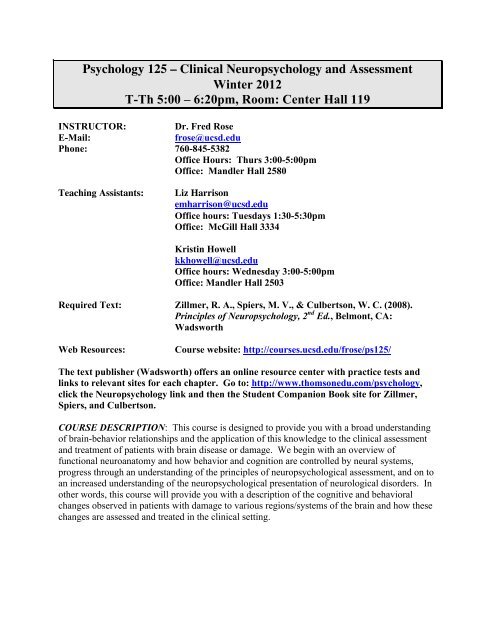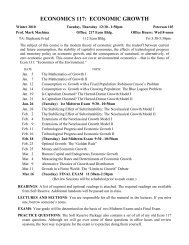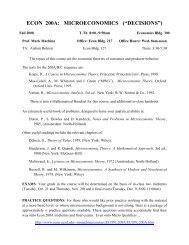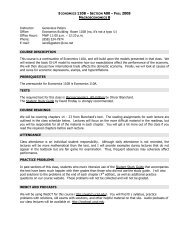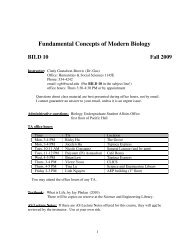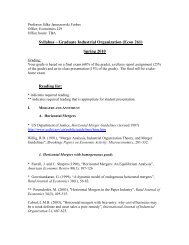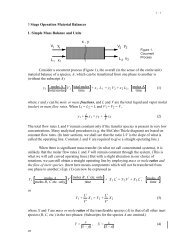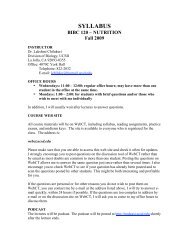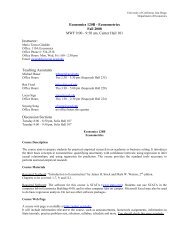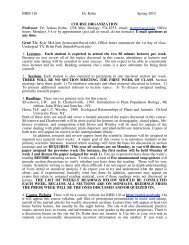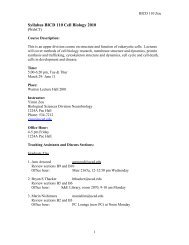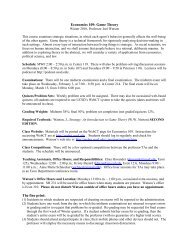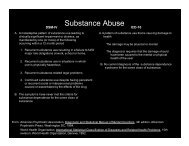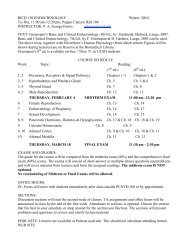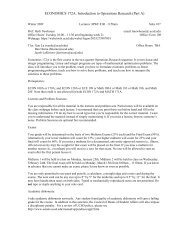Psychology 125 – Clinical Neuropsychology and ... - Courses
Psychology 125 – Clinical Neuropsychology and ... - Courses
Psychology 125 – Clinical Neuropsychology and ... - Courses
Create successful ePaper yourself
Turn your PDF publications into a flip-book with our unique Google optimized e-Paper software.
<strong>Psychology</strong> <strong>125</strong> <strong>–</strong> <strong>Clinical</strong> <strong>Neuropsychology</strong> <strong>and</strong> Assessment<br />
Winter 2012<br />
T-Th 5:00 <strong>–</strong> 6:20pm, Room: Center Hall 119<br />
INSTRUCTOR: Dr. Fred Rose<br />
E-Mail: frose@ucsd.edu<br />
Phone: 760-845-5382<br />
Office Hours: Thurs 3:00-5:00pm<br />
Office: M<strong>and</strong>ler Hall 2580<br />
Teaching Assistants: Liz Harrison<br />
emharrison@ucsd.edu<br />
Office hours: Tuesdays 1:30-5:30pm<br />
Office: McGill Hall 3334<br />
Kristin Howell<br />
kkhowell@ucsd.edu<br />
Office hours: Wednesday 3:00-5:00pm<br />
Office: M<strong>and</strong>ler Hall 2503<br />
Required Text: Zillmer, R. A., Spiers, M. V., & Culbertson, W. C. (2008).<br />
Principles of <strong>Neuropsychology</strong>, 2 nd Ed., Belmont, CA:<br />
Wadsworth<br />
Web Resources: Course website: http://courses.ucsd.edu/frose/ps<strong>125</strong>/<br />
The text publisher (Wadsworth) offers an online resource center with practice tests <strong>and</strong><br />
links to relevant sites for each chapter. Go to: http://www.thomsonedu.com/psychology,<br />
click the <strong>Neuropsychology</strong> link <strong>and</strong> then the Student Companion Book site for Zillmer,<br />
Spiers, <strong>and</strong> Culbertson.<br />
COURSE DESCRIPTION: This course is designed to provide you with a broad underst<strong>and</strong>ing<br />
of brain-behavior relationships <strong>and</strong> the application of this knowledge to the clinical assessment<br />
<strong>and</strong> treatment of patients with brain disease or damage. We begin with an overview of<br />
functional neuroanatomy <strong>and</strong> how behavior <strong>and</strong> cognition are controlled by neural systems,<br />
progress through an underst<strong>and</strong>ing of the principles of neuropsychological assessment, <strong>and</strong> on to<br />
an increased underst<strong>and</strong>ing of the neuropsychological presentation of neurological disorders. In<br />
other words, this course will provide you with a description of the cognitive <strong>and</strong> behavioral<br />
changes observed in patients with damage to various regions/systems of the brain <strong>and</strong> how these<br />
changes are assessed <strong>and</strong> treated in the clinical setting.
COURSE OBJECTIVES: By the end of the course, you will have:<br />
1. developed a broad knowledge of the history, terminology, <strong>and</strong> concepts essential to the<br />
field of clinical neuropsychology.<br />
2. acquired a basic underst<strong>and</strong>ing of the major assumptions that underlie the study of brainbehavior<br />
relationships<br />
3. an underst<strong>and</strong>ing of various ways in which neuropsychological research is conducted.<br />
4. greater appreciation for psychometric principles essential to the development <strong>and</strong> use of<br />
neuropsychological tests<br />
5. acquired a basic knowledge of the kinds of assessment instruments used by clinical<br />
neuropsychologists<br />
6. acquired a general underst<strong>and</strong>ing of how major neuropsychological disorders present to<br />
clinicians.<br />
7. increased underst<strong>and</strong>ing of treatment <strong>and</strong> rehabilitation are used to improve the lives of<br />
persons with brain disease or damage.<br />
COURSE FORMAT: The course will be conducted in a series of self-contained lectures.<br />
However, later lectures will depend on your mastery of earlier material, particularly those<br />
detailing functional neuroanatomy, research methods, <strong>and</strong> neuropsychological assessment.<br />
ASSIGNED READINGS: All students are expected to have read the assigned readings before<br />
the class in which they are to be discussed. Supplemental readings (i.e., assigned readings that<br />
are not in your textbook) are available on the course website.<br />
GRADING<br />
Exams: There will be 2 midterm exams worth 100 points each <strong>and</strong> one comprehensive final<br />
examination worth 200 points. The questions will be taken from the text, supplementary<br />
readings, <strong>and</strong> lectures. Each exam will cover a fair bit of material <strong>and</strong> will be challenging. The<br />
best way to do well is to stay on top of the reading, attend class regularly, <strong>and</strong> be an active<br />
learner (i.e., quiz yourself, take notes, form study groups, visit the textbook companion website,<br />
come to our office hours, etc.).<br />
Exams will take place on the days listed in this syllabus. Make up exams will be given ONLY<br />
in unusual <strong>and</strong> unavoidable circumstances such as medical illness requiring bed rest or the<br />
death of an immediate family member. There will be no exceptions. It is your<br />
responsibility to contact either myself or one of the TA’s in advance whenever possible if<br />
you are forced to miss an exam. Written verification of these circumstances is required <strong>and</strong> is<br />
your responsibility. Dr. Rose reserves the right to determine what constitutes an acceptable<br />
excuse. As a general rule of thumb, transportation problems, childcare problems, ski trips, <strong>and</strong><br />
hangovers are not acceptable excuses.<br />
Extra Credit: You may extra credit through participation in research activities at UCSD. You<br />
will earn 3 points for each credit of research participation, to a maximum of 12 points (4 credits).<br />
Go to https://experimetrix2.com/ucsd/ to register for participation. It is up to you to assign<br />
your credit hours to this class through the experimetrix website after you participate; you
will not get the extra credit if you do not properly assign participation credit to this class.<br />
Be sure to pay attention to participation <strong>and</strong> credit assignment deadlines! If you are unable or do<br />
not wish to participate in experimental research, an alternative is to review a neuropsychological<br />
journal article <strong>and</strong> write a short 1-2 page summary that includes the question being asked,<br />
hypothesis (predicted outcome), independent <strong>and</strong> dependent variables, findings, <strong>and</strong><br />
implications. You will receive 3 points for each paper you turn in (max of 12 points or 4<br />
papers). The paper must be about an experiment from a peer-reviewed scientific journal that you<br />
read - NOT a topic you found online or in the popular press like Newsweek or Time. It should<br />
also be something related to the field of neuropsychology. Thus, you would look at major<br />
neuropsychology journals like:<br />
Archives of <strong>Clinical</strong> <strong>Neuropsychology</strong><br />
Dementia<br />
Developmental <strong>Neuropsychology</strong><br />
Journal of <strong>Clinical</strong> <strong>and</strong> Experimental <strong>Neuropsychology</strong><br />
Journal of the International Neuropsychological Society<br />
Neuropsychologia<br />
<strong>Neuropsychology</strong><br />
The <strong>Clinical</strong> Neuropsychologist<br />
etc.<br />
For a rather complete list, go to: http://www.psychwatch.com/neuro_journals.htm<br />
So, there are a total of 400 points available, not including extra credit for research participation,<br />
<strong>and</strong> your course grade will be assigned according to the following criteria:<br />
90% = 360-400 points = A<br />
80% = 320-259 points = B<br />
70% = 280-319 points = C<br />
60% = 240-279 points = D<br />
Below 240 points = F<br />
NOTE: I WILL grade with +/-. A minus grade is earned in the 0-2.5% range, <strong>and</strong> plus<br />
grades are from 7%-9%. For example, 90-92.5% is an A-, 92.6%-96.9% is an A, <strong>and</strong> 97%<br />
<strong>and</strong> above is an A+.<br />
Which brings me to a second issue. I DO have to make cutoffs when assigning grades (duh!)<br />
<strong>and</strong> I am firm in those cutoffs. If you earned 259 points, your grade is a B+, not an A-, <strong>and</strong> I<br />
won’t bump you that 1 point to get the A-. That is what the extra credit is for. If I bump your<br />
grade by 1 point, then I ethically <strong>and</strong> morally have to bump everybody 1 point. Then the people<br />
who were 2 points away from a particular grade are now just 1 away, <strong>and</strong> can legitimately state,<br />
“But you gave everybody a point for so-<strong>and</strong>-so. Can’t you do it for me?” And on <strong>and</strong> on.<br />
Please do not approach me for the extra point or two necessary to bump your grade. I will<br />
ALWAYS talk with you about your performance throughout the quarter, answer questions,<br />
clarify issues, <strong>and</strong> generally do what I can to help you maximize your performance in class, but<br />
once the points are in, the grades are what they are.
ATTENDANCE: Class attendance is expected <strong>and</strong> highly desirable. Please be prepared for<br />
class by reading all assigned material. Lectures are designed to clarify <strong>and</strong> exp<strong>and</strong> on concepts<br />
covered in the reading <strong>and</strong> to accomplish this they include but will not be restricted to the<br />
readings. You are responsible for the content of all classes. If you must miss a class, you should<br />
make an effort to obtain notes from a classmate. Class notes will be posted on the course<br />
website but they are not designed to replace class participation.<br />
COURSE POLICIES: 1. Be on time.<br />
2. Turn off your cell phones, pagers, etc.<br />
3. If you miss a class, which will likely come back to haunt you, call<br />
a classmate before you talk to me.<br />
4. Cheating <strong>and</strong> plagiarizing are very serious ethical offenses in<br />
college, in psychology, <strong>and</strong> in society. If caught doing so in this<br />
class, at the very least you will receive a 0 (zero) on that<br />
component of the class <strong>and</strong> I may report your actions. It just isn’t<br />
worth it!<br />
5. Assignment of extra credit experimental credits via the<br />
Experimetrix website is YOUR RESPONSIBILITY. PERIOD. If<br />
you fail to assign your credits to this class after your participate,<br />
you will NOT receive the extra credit for participation.
COURSE SCHEDULE: Topics will be covered approximately in the order listed below. I will<br />
make every attempt to cover them on the days listed, but I reserve the right to make changes to<br />
the schedule. You will always be provided with advanced notice on any such changes. NOTE:<br />
Readings in italics are supplemental to the text <strong>and</strong> can be found on the course website.<br />
Date Topic Reading<br />
Jan 10, 12 Course overview Chapter 2<br />
Methods of Investigating the Brain Bauer, Leritz, & Bowers<br />
(2003)<br />
Jan 17, 19 Neuropsychological Assessment Chapter 3<br />
Howieson & Lezak (1992)<br />
Jan 24, 26 Functional Neuroanatomy Chapter 5<br />
Sensation, perception, <strong>and</strong> motor behavior Chapter 7<br />
Jan 31 Midterm 1 - Will cover all assigned/supplemental readings <strong>and</strong> lectures<br />
Feb 2, 7 Vision/Agnosias Chapter 8<br />
Language/Aphasia Geschwind (1970)<br />
Feb 9, 14 Memory <strong>and</strong> Executive functioning Chapter 9<br />
Schachter (1998)<br />
Damasio et al. (1994)<br />
Feb 16, 21 Vascular disorders <strong>and</strong> Tumors Chapter 12<br />
Feb 23 Midterm 2 <strong>–</strong> Will cover all assigned readings <strong>and</strong> lectures since Midterm 1<br />
Feb 28, Mar 1 TBI <strong>and</strong> Rehabilitation Chapter 13<br />
March 6, 8 Cortical Dementias Chapter 14<br />
March 13, 15 Subcortical Dementias Chapter 15<br />
March 22 Final Exam 7:00 <strong>–</strong> 10pm; 50% will cover material since Midterm 2, 50%<br />
comprehensive<br />
NOTE THE TIME CHANGE: The final will be from 7:00 <strong>–</strong> 10pm


